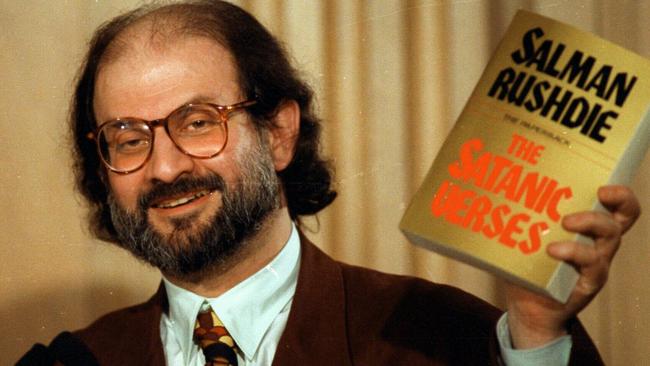New $840,000 bounty put on Salman Rushdie’s head
A fresh bounty of $840,000 has been placed on Sir Salman Rushdie’s head by Iranian organisations.

A fresh bounty of US$600,000 ($840,000) has been placed on the life of Sir Salman Rushdie by Iranian organisations including the state-sponsored Fars News Agency.
The reinforcement of the fatwa coincides with the 27th anniversary of the religious edict by Ayatollah Khomeini, Iran’s first supreme leader. Khomeini called for Rushdie’s assassination on charges of blasphemy after the publication of his novel The Satanic Verses.
The resurrection of the threat is seen as a warning from hardliners who are dissatisfied with President Rouhani’s perceived rapprochement with the West since last year’s nuclear deal.
Iranians will choose their next parliament on Friday, as well as the assembly of experts, a clerical body in charge of appointing the next supreme leader. Hardliners are struggling to keep power as reformists seek a comeback.
The original fatwa caused a break in Britain’s diplomatic relations with Iran. It was suspended in 1998 when Mohammad Khatami, then the president of Iran, announced as a precondition to the restoration of ties with Britain that the Iranian state would “neither support nor hinder assassination operations”.
The sources of the new bounty, which has not been reinforced by any statement from Iran’s government, has been kept deliberately opaque. It came to light on February 17 in an account by an unnamed journalist at Fars of a digital media fair in Tehran. The story included a declaration by a man known as “Mr Amini”, setting a bounty equivalent to $600,000, and listed 40 organisations, including NGOs and private donors, which had pledged the money.
Fars, which pledged 100 million Tomans (AUD$47,000), was among the top three cash donors named on the list, which also included the Centre for Cultural and Science Research, Miqat Radio and the Iranian Centre for Training Journalists.
On several occasions over the past two decades Iranian religious figures have reiterated their support of the fatwa, and the original reward equivalent to AUD$2.80 million for Rushdie’s death had been increased in instalments by private organisations to AUD$4.6 million even before the latest pledge.
A senior member of the editorial team at the Fars head office in the Iranian capital, who asked not to be named, defended his agency’s pledge. “The fatwa against Salman Rushdie is a religious fatwa,” he told The Times. “Nobody in the world can nullify a religious fatwa. It has been, it is, and it will be.”
However, he denied state sanction for the pledge, which he described as “a promise” rather than as payment. Stressing that it had been made by non-governmental organisations he also claimed that, though state-funded, Fars was technically privately owned.
“The Islamic Republic has said before now that it will do nothing to execute Salman Rushdie,” he said. “These donors are NGOs and private people.”
In the early years of the fatwa Rushdie was forced to go into hiding under police protection as bookshops across the world were destroyed and people associated with the translation or publication of his book were attacked.
In August 1989 Mustafa Mahmoud Mazeh, 21, died at the Beverley House Hotel in Paddington when a bomb he was making went off. Although it has never been officially acknowledged that Mazeh was trying to kill the author, a plaque in his memory in Tehran carried the words: “The first martyr to die on a mission to kill Salman Rushdie.”
Rushdie now leads a relatively normal life in New York. Asked in an interview with The Times last year whether New Yorkers were surprised to see him in Manhattan, he said: “I’ve been walking around the streets for all that time, taking the subway and catching taxis with Muslim taxi drivers.”
His son, Zafar Rushdie, who is also his publicist, declined to comment on the new bounty.
Jo Glanville, director of English PEN, an organisation that defends freedom of expression and has worked with Rushdie for many years, said: “Given the new relations between Iran and the West, I think we rather hoped [the fatwa] might disappear.” She added, however, that “his life has very substantially changed since those very difficult early days.”
The Times


